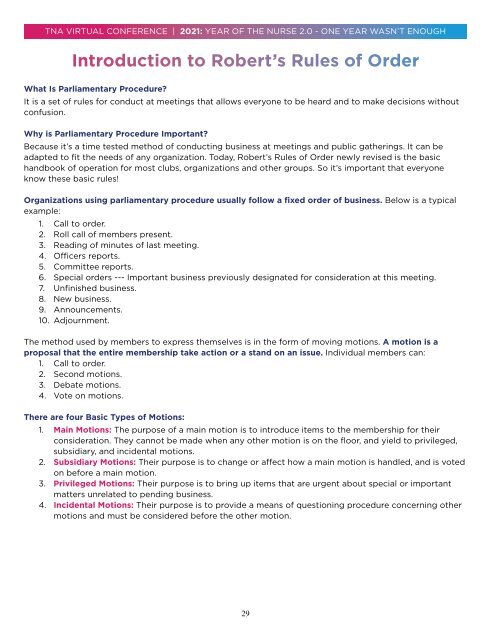2021 TNA Virtual Conference
Create successful ePaper yourself
Turn your PDF publications into a flip-book with our unique Google optimized e-Paper software.
<strong>TNA</strong> VIRTUAL CONFERENCE | <strong>2021</strong>: YEAR OF THE NURSE 2.0 - ONE YEAR WASN’T ENOUGH<br />
Introduction to Robert’s Rules of Order<br />
What Is Parliamentary Procedure?<br />
It is a set of rules for conduct at meetings that allows everyone to be heard and to make decisions without<br />
confusion.<br />
Why is Parliamentary Procedure Important?<br />
Because it’s a time tested method of conducting business at meetings and public gatherings. It can be<br />
adapted to fit the needs of any organization. Today, Robert’s Rules of Order newly revised is the basic<br />
handbook of operation for most clubs, organizations and other groups. So it’s important that everyone<br />
know these basic rules!<br />
Organizations using parliamentary procedure usually follow a fixed order of business. Below is a typical<br />
example:<br />
1. Call to order.<br />
2. Roll call of members present.<br />
3. Reading of minutes of last meeting.<br />
4. Officers reports.<br />
5. Committee reports.<br />
6. Special orders --- Important business previously designated for consideration at this meeting.<br />
7. Unfinished business.<br />
8. New business.<br />
9. Announcements.<br />
10. Adjournment.<br />
The method used by members to express themselves is in the form of moving motions. A motion is a<br />
proposal that the entire membership take action or a stand on an issue. Individual members can:<br />
1. Call to order.<br />
2. Second motions.<br />
3. Debate motions.<br />
4. Vote on motions.<br />
There are four Basic Types of Motions:<br />
1. Main Motions: The purpose of a main motion is to introduce items to the membership for their<br />
consideration. They cannot be made when any other motion is on the floor, and yield to privileged,<br />
subsidiary, and incidental motions.<br />
2. Subsidiary Motions: Their purpose is to change or affect how a main motion is handled, and is voted<br />
on before a main motion.<br />
3. Privileged Motions: Their purpose is to bring up items that are urgent about special or important<br />
matters unrelated to pending business.<br />
4. Incidental Motions: Their purpose is to provide a means of questioning procedure concerning other<br />
motions and must be considered before the other motion.<br />
29

















